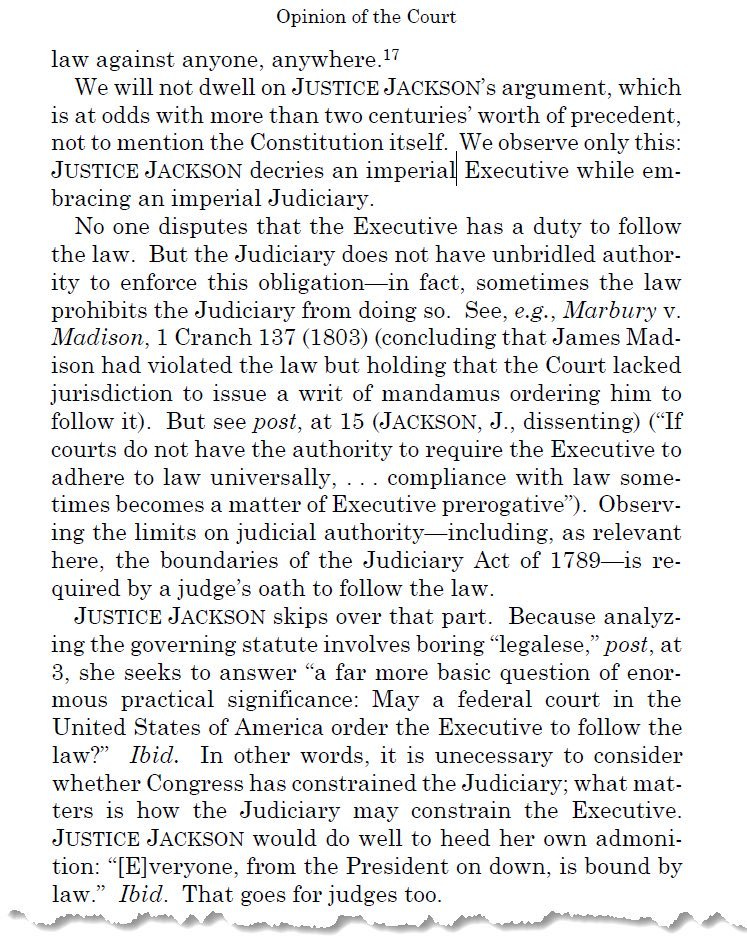One Judge to Rule Them All? The Ban on Nationwide Injunction Abuse Restores the Separation of Powers
In Justice Barrett's words, the Supreme Court's ruling doesn't create an imperial executive: it dismantles an imperial judiciary.
Normally our Deep Dives are reserved for our Premium and Founding Members, but this topic is of such great importance that we’ve decided to make it free for everyone.
by Rod D. Martin
June 30, 2025
If our current Supreme Court comes to be known for anything, it will be that it was the Court that restored Constitutional limits and the separation of powers.
And that’s exactly what was at stake on Friday in Trump v. CASA, Inc. with regard to nationwide injunctions.
The case itself concerns the contentious issue of birthright citizenship, a matter on which I’ve written at some (hopefully persuasive) length, and even publicly debated a Yale Law professor (you can watch that here).
But the Justice Department wisely chose to argue not the merits of that case — they’ll get to that shortly — but rather the procedural issue regarding whether a single local federal judge has the power to shut down an entire Presidential policy initiative, not just as to the plaintiff before it, but as to everyone everywhere.
Writing for the majority in a 6-3 ruling, Justice Amy Coney Barrett found that to be beyond the powers granted federal courts in the Constitution or the Judiciary Act. She wrote “When a court concludes that the Executive Branch has acted unlawfully, the answer is not for the court to exceed its power, too.”
She goes on. Criticizing Justice Ketanji Brown Jackson’s hyperpolitical dissent, Barrett writes “Justice Jackson would do well to heed her own admonition: "‘[E]veryone, from the President on down, is bound by law.’ That goes for judges too.”
Barrett added: “We will not dwell on Justice Jackson’s argument, which is at odds with more than two centuries worth of precedent, not to mention the Constitution itself,” the justice said. “We observe only this: Justice Jackson decries an imperial Executive while embracing an imperial Judiciary.”
Why does it matter? At its most basic, because single local Democrat judges have issued more of these nationwide, or universal, injunctions against President Trump than against all other Presidents combined. This isn’t judicial review: it’s pure partisanship. In effect, it’s an effort to overturn the outcome of an election. Some might call that a coup.
But at a more insidious, longer-term level, the issuance of these unlawful injunctions is an assertion of judicial supremacy over the elected branches, one the Founders would neither have recognized nor even imagined. And that’s one more piece of FDR’s anti-Constitutional revolution, setting up a system of de facto one-party rule, in which voters retain the illusion of elections, but in reality, a permanent Deep State permanently populated by unaccountable, largely unfireable Democrats — from these judges to the Congressional Budget Office (CBO) to a ravening hoard of so-called “independent” agencies — ensures that Democrat policies continue no matter who or what the voters choose.
In that broader context, nationwide injunctions were a bit of a desperation play — TDS perhaps? — as evidenced by the hysterical and unprecedented frequency with which they’ve been employed against Trump.
But that ends now.
When I was in law school, the measure of a “conservative judge” was his slavish devotion to stare decisis, or precedent. But I asked then and I maintain now: how does that standard not fly in the face of a written constitution, duly adopted and ratified by the people? Wouldn’t that approach necessarily saddle us with Plessy v. Ferguson, or Dred Scott, forever? And shouldn’t a true judicial conservative take a machete to bad precedent, adhering tenaciously only to the Constitution itself?
It’s clear, from Jarkesy to Dobbs to CASA, we finally have a Supreme Court that agrees.
“The Resistance”
Democrats spent the last decade telling us that “democracy is on the ballot”, scaremongering about the threat Donald Trump supposedly posed to voters having a say over their fate.
Ironic, then, that now out of power, those same Democrats are using every means available to thwart those same voters. A January poll found that 42% of Deep State bureaucrats intend to “resist” the elected President. Clearly someone should have polled the judges too.
The thing is, this violates the Constitution and all their oaths of office. Article 2, Section 1 of the U.S. Constitution is perfectly clear: “The executive Power shall be vested in a President of the United States of America.” Not “independent agencies”, not career Deep Staters, and certainly not the other branches of government. Why even bother to have elections at all if the people elected are prevented from doing their jobs?
But you know the answer: “Our Democracy”, that most cherished of ideals, really just means “rule by Democrats”. Nearly the whole bureaucracy is Democrats, so they must be free to do whatever Democrats want. Elections are irrelevant if the people “get it wrong.” And how could they be more ignorant and more wrong than by opposing policies demanded by Democrats?
But the American Republic was not designed to be ruled by an army of permanent bureacrats or a clique of unelected judges. Courts are very pointedly not legislatures, and are prohibited from exercising legislative or executive powers. Their job is to call balls and strikes, within the confines of the Constitution. They are not to join the game, or rewrite the rules.
And not only that: the President is required to exercise executive powers. It is not an abuse of power for him to do those things which have always been understood to fit within that definition: it’s what he swore to do. In setting up three branches with different powers, the Founding Fathers intentionally created a messy system whose ultimate arbiter is always an election.
But why let a little thing like the Constitution get in the way of “progress”?
For years now, radical Democrat judges have transformed the judiciary into a weapon of mass obstruction, deploying nationwide injunctions to paralyze the executive branch and nullify presidential authority. These injunctions — legal orders issued by a single local district judge that block federal policies from being enforced anywhere across the country — are an innovation of the modern left, a judicial coup designed to neutralize Republican administrations before they can govern.
And big shocker: no president has suffered more from this abuse than Donald J. Trump.
During Trump’s first term, activist judges struck down executive orders on immigration, energy, deregulation, and national security, effectively usurping executive authority and rewriting federal policy from the bench. The attitude was clear: whatever a Democrat president does must stand forever, even if the electorate rejects it. “Settled law”, like “settled science”, means once Democrats have decided something, no one may ever question it again.
Now, in Trump’s second term, this obstruction has reached new extremes. Judges in Maryland and Washington enjoined his executive order on birthright citizenship before it could be enforced, not merely as to the plaintiffs (as required by the Constitution and the Judiciary Act) but as to all others everywhere. Another judge forced the administration to reinstate a Biden-era official in the Office of Special Counsel, overriding the President’s appointment power. A Washington judge ruled that Trump had to restore Biden-era transgender propaganda to the FDA and CDC websites. Yet another ordered the executive branch to restore federal funding to Biden programs Trump had lawfully defunded. And in perhaps the most egregious example, a single district judge blocked the Senate-confirmed Treasury Secretary from accessing his own department’s financial records.
I kid you not.
This is not law — it is rule by judicial fiat. It is intended to tie up every policy in the courts for years until Democrats either win or the point is rendered moot. It is an effort by Democrats to maintain their control over the country no matter what the voters have to say.
The problem extends beyond mere policy obstruction. It’s an outright usurpation of Article II executive power. Judges are not simply ruling on the legality of specific executive actions; they are preemptively blocking the president from exercising his constitutional authority.
Democrats understand this on the rare occasion they’ve been faced with the same problem. Consider the Biden administration’s reaction when Trump-appointed Judge Carl Nichols issued a temporary restraining order against the Biden administration for attempting to realign USAID personnel — which in my view he should not have done. The then Democrat-led Department of Justice responded with outrage, arguing that the court had no jurisdiction over routine executive personnel decisions.
The hypocrisy is glaring. When a Democrat president asserts executive authority, judicial interference is an outrage. But when a Republican president exercises the same power, judges rush to enjoin him at every turn. And I repeat: Trump has been slapped with more nationwide injunctions than all other Presidents combined. Quite a lot more, in fact.
Ending Nationwide Injunction Abuse
In my February Deep Dive on this topic, I pointed out that this has become a crisis, one which demands an immediate fix. Nationwide injunctions must be abolished or, at the very least, severely restricted, I said. I suggested several ways to attack the problem, including Congressional action, enforcement of Rule 65(c) of the Federal Rules of Civil Procedure requiring that plaintiffs post bond for their billion-if-not-trillion dollar demands, expedited Supreme Court review, and of course, where appropriate, executive resistance: all three branches are empowered to defend the Constitution, after all.
But I also suggested that the Supreme Court could solve this problem. And solve it they did, holding that neither the Constitution nor the Judiciary Act nor more than two centuries of precedent allows rogue judges to enjoin anyone except the parties before them, regarding the facts of their individual cases.
In other words, these judges have never held this power.
Furthermore, lest you worry that the President has now been made a king, the Court made clear that it — the only court with actual nationwide jurisdiction — retains the ability to enjoin actual abuses by the Administration. “After today’s decision, that order of operations will not change,” Kavanaugh wrote in his concurring opinion. “In justiciable cases, this Court, not the district courts or courts of appeals, will often still be the ultimate decisionmaker as to the interim legal status of major new federal statutes and executive actions — that is, the interim legal status for the several-year period before a final decision on the merits.”
This is exactly what I argued for in February. It’s the re-establishment of the Separation of Powers, without giving up checks and balances.
It is an elegant, and entirely appropriate, decision.
Practical Consequences and Restoring the Rule of Law
The judiciary was never meant to function as an unelected, unaccountable super-legislature. Yet that is precisely what it had become, thanks to the weaponization of nationwide injunctions. Democrats discovered they could paralyze Republican presidents by funneling lawsuits through handpicked activist judges who will reliably issue sweeping, now clearly illegal injunctions freezing executive action.
But that game is now over.
Donald Trump is now empowered to vigorously pursue a range of policies he was elected on. Ultimately, they may be overruled on their merits, legislated against by Congress, or simply not work out as intended. But as I keep saying, elections have to matter. The people spoke when they elected Barack Obama, and they spoke when they elected Donald Trump. They should get their way, within the boundaries set by the Constitution. They should not be spoken down to as though they are wayward children.
The right answer to most failures of government is an election.
The Supreme Court took back a lot of lost ground on Friday. It likely wouldn’t have but for Donald Trump.
The President’s counterrevolution rolls on.













Thank God they finally did this! The 'democratic' judges should to be striped of their power. But this ruling is at least a step in the right direction.
Wonderful analysis, Rod.